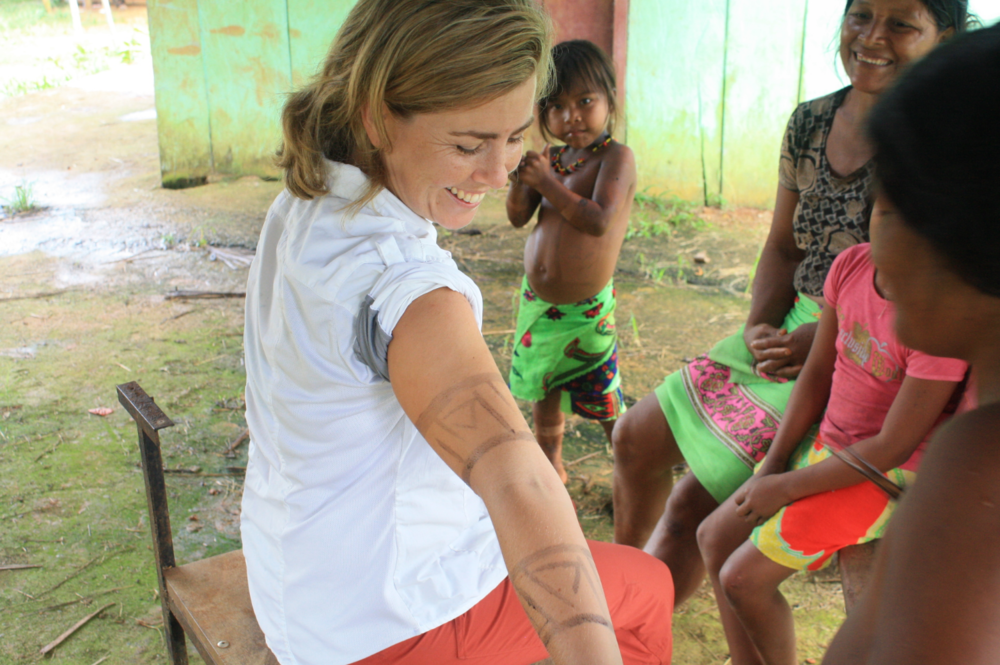Author of fifty-plus travel guides and many articles, Carolyn McCarthy seeks out original stories, explores environmental issues, and works to create meaningful connections with local cultures. Specialized in remote travel, she has explored the Amazon Basin via dugout canoe and solo hiked Patagonia to write Lonely Planet’s Trekking in the Patagonian Andes. Before that, she was a Fulbright fellow in Patagonia, where she researched the disappearing pioneer culture. She has also written for BBC News Magazine, Lonely Planet Magazine, Outside, Sierra, National Geographic and other publications.
How did you get started traveling?
I was a late bloomer. Though my childhood vacations were spent visiting French-speaking relatives in a small village in my mother’s native Quebec, I only set out on my own in my mid-twenties when a friend cancelled plans to meet me in Mexico. I doubt I would would have taken the initiative to go solo otherwise. I was suddenly doggie paddling in the deep end, but each day blew my mind. Now I think that everyone should try solo travel. If you can make it through each increment of each day, you can make it.
How did you get started writing?
I wrote bad short stories and kept notebooks throughout growing up, but I started publishing travel essays after I had spent a year living in and traveling throughout South America. Nonfiction was a better fit for me. I discovered I liked being out in the world, finding stories and talking to people, not knowing where the day might take me.
What do you consider your first “break” as a writer?
The now-defunct South American Explorers Magazine published an essay I wrote about Buenos Aires, called “Isn’t it Romantic?” Buenos Aires is so theatrical that it can feel otherworldly, particularly when it comes to the pursuit of romance. I was teaching English and one day a private student cancelled because his dog had fallen from his balcony trying to reach another dog in heat. He jumped. That bizarre event made me want to explore why seduction felt so high-stakes in this culture, in part through my own abominable dating experiences there, thanks to my inability to read the culture. I did more articles for the magazine and decided to study creative writing in a graduate program.
As a traveler and fact/story gatherer, what is your biggest challenge on the road?
The inherent challenge is that there just isn’t enough time in the day, so how do you prioritize? How do you actually explore when you need to update existing information too? The only way I’ve figured out how to do it is by returning to the same regions, each time making time to explore something that’s new to me.
Also, I find that it’s always worth taking the time to befriend locals, who can bring a whole new perspective to your work. Long, leisurely conversations are a luxury. But when you think about what they give you, they’re also essential. So it’s about making time for meaningful interactions and exploration, as well as getting the goods.
What is your biggest challenge in the research and writing process?
For at least the first few days of writing, the biggest challenge is sitting still! Beyond that, you often have more content than you can possibly use, so it takes some crafting to pack in information that’s both useful and insightful. Making sure readers have the context of why a service is cheap or expensive can be just as important as giving them the contact information.
What is your biggest challenge from a business standpoint?
As a freelancer one never knows what the year will bring. For me, that means that I tend to overbook myself with work, which means I’m often writing weekends, nights and holidays. Your life gets put on hold. At this point I am trying to create more space between trips and assignments.
Have you ever done other work to make ends meet?
Always. A writing degree is just a point of departure. You have to earn your spot gig by gig. I crab-walked into travel writing while teaching ESL, house painting, tutoring and guiding treks. That said, all that experience has informed my writing. Working in the tourism industry helped me see behind the curtain, where responsible practices can just be lip service, and also understand the qualities to look for in guides and services.
What travel authors or books might you recommend and/or have influenced you?
I love far-flung adventures to places I haven’t been and writers who can be serious and playful. For that, Redmond O’Hanlon’s In Trouble Again, Coconut Chaos by Diana Souhami, Sun, Wind & Stars by Antoine St-Exupery and Songlines by Bruce Chatwin are wonderful. I am also a sucker for gripping old-school explorers’ tales that tell about the first expeditions to places like Antarctica and Patagonia. I love the consideration brought into those narratives. Before social media and mass-travel, describing landscapes and situations took on a whole other level of importance. And the stakes were real.
What advice and/or warnings would you give to someone who is considering going into travel writing?
I would tell them to soak everything up like a sponge and look for meaning everywhere, not just in the cultural icons and landmarks. Even a trip to a Ugandan big box store will give you insight.
What is the biggest reward of life as a travel writer?
It’s a privilege to bear witness to the infinite permutations of life on this planet. It’s also humbling. Your own life feels easier because you’ve seen places where it’s so much harder. People are generally much better than the evening news would have you believe. And there’s always this moment of, how did I get here? That’s pure pleasure.

